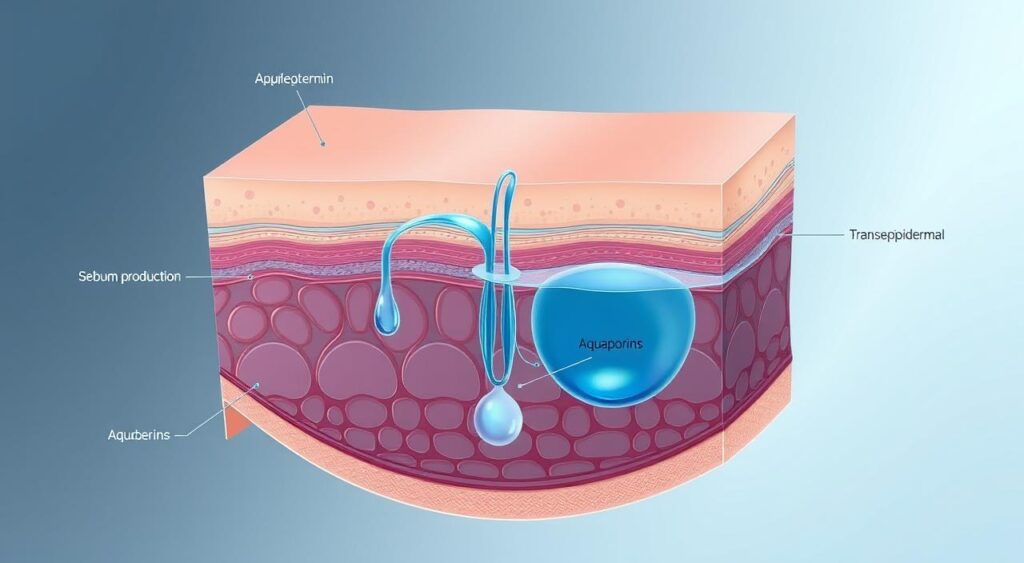Discover essential steps to avoid skin maceration and keep your skin healthy.
About 50% of people deal with skin maceration at some time. It’s a big reason why keeping skin hydrated is key. This condition can cause irritation, infection, and more. So, knowing how to prevent it is very important.

Introduction to Skin Care
Healthy, hydrated skin is crucial for our overall health. Skin maceration can happen for many reasons, like too much moisture or poor skin care. Learning about skin hydration and how to avoid maceration helps keep our skin strong.
Key Takeaways
- Skin maceration affects a significant percentage of the population, emphasizing the need for proper skin care and hydration.
- Proper skin hydration is essential for maintaining healthy skin and preventing skin maceration.
- Understanding the causes of skin maceration can help individuals take preventive measures.
- Excessive moisture can lead to skin maceration, highlighting the importance of moisture management.
- Good skin care habits and proper skin hydration can help prevent skin maceration and maintain healthy skin.
Understanding Skin Maceration and Its Impact
Skin maceration is a common problem that many people face. It happens when the skin’s natural skin barrier function is broken. This lets too much moisture in, causing damage.
This damage can lead to skin irritation, redness, and a higher chance of infection. Keeping the skin’s skin moisture levels healthy is key to avoiding maceration.
When the skin’s barrier works right, it keeps moisture in balance. But if it’s damaged, the skin can’t handle moisture well. This makes it more likely to macerate.
- Prolonged exposure to water or moisture
- Certain skin conditions, such as eczema or psoriasis
- Poor hygiene or inadequate skin care
Knowing what causes skin maceration helps people protect their skin. They can keep their skin moisture levels healthy. This way, they can lower their risk of maceration and its problems.
Next, we’ll look closer at the skin barrier function. We’ll also talk about how to keep skin healthy and prevent maceration.
Signs and Symptoms of Macerated Skin
Macerated skin shows signs like redness and swelling. It can also feel soft and wet. These symptoms are due to the skin’s natural moisture barrier being broken.
When the skin’s barrier is damaged, it can’t keep moisture in. This leads to the skin becoming soft and wet. It’s a sign that the skin is not doing its job well.
Other signs of macerated skin include cracks and sores. These can be painful and make the skin more prone to infection. It’s important to take care of the skin to prevent these problems.
By keeping the skin dry and using protective barriers, you can help prevent macerated skin. This includes using creams and ointments to lock in moisture. It’s also important to avoid rubbing or scratching the skin, as this can make the problem worse.
By recognizing the signs and symptoms of macerated skin, you can take steps to protect your skin. This will help keep it healthy and prevent further damage.
Common Signs and Symptoms of Macerated Skin:
- Redness
- Swelling
- Softness
- Wetness
- Cracks
- Sores
By being aware of these signs and symptoms, you can take action to protect your skin. This will help prevent macerated skin and keep your skin healthy.
The Science Behind Skin Barrier Function
It’s key to know how the skin works to stay healthy. The skin keeps the right amount of moisture inside. This helps stop skin from getting too wet and soft.
A strong skin barrier is vital to avoid skin maceration prevention. It controls how much moisture gets in or out. This keeps the skin balanced and healthy, stopping problems like skin maceration.
Many things can harm the skin’s barrier, like the weather, what we use on our skin, and some health issues. Knowing these can help us protect our skin. Keeping the right dermal water balance lowers the chance of skin maceration and other skin issues.
Key Factors Affecting Skin Barrier Function
- Environmental factors, such as humidity and temperature
- Skin care products, such as harsh soaps and cleansers
- Certain medical conditions, such as diabetes and eczema
Understanding what affects the skin’s barrier helps us keep it healthy. We can use gentle products, stay away from harsh weather, and manage health issues. This way, we can keep the dermal water balance right and avoid skin maceration prevention.
High-Risk Areas for Skin Maceration
To prevent skin maceration, we need to focus on keeping our skin hydrated and strong. Understanding the role of skin hydration and barrier function is crucial. This knowledge helps us take steps to avoid skin maceration.
Preventing skin maceration involves several key steps. Keeping our skin hydrated is one of them. Using the right skin care products is another. We also need to control our environment to protect our skin.
- Apply moisturizers regularly to maintain healthy skin hydration
- Use gentle cleansers that do not strip the skin of its natural oils
- Avoid harsh environmental factors, such as extreme temperatures and humidity
By following these strategies, we can keep our skin healthy and avoid skin maceration. Remember, prevention is key. Taking proactive steps can greatly help in maintaining healthy skin hydration and barrier function.
Treatment Options for Macerated Skin
Keeping your skin moisture levels healthy is key to treating macerated skin. Topical creams and ointments can help lock in moisture. They also support the skin’s natural barrier. Dressings can protect the area and aid in healing.
Knowing how important epidermal water content is in treating skin maceration is crucial. Using products that keep the skin’s moisture balance is vital. This reduces irritation and damage risk. Some effective treatments include:
- Topical creams and ointments to lock in moisture
- Dressings to protect the affected area and promote healing
- Moisturizers to maintain the skin’s natural moisture balance
If symptoms don’t get better or get worse, see a doctor. A healthcare professional can guide you on the best treatment. They can also help prevent more problems.
Professional Care and Medical Interventions
If skin maceration is severe, getting professional help is key. Keeping the dermal water balance right is vital to avoid more skin harm. When the skin’s barrier is down, it loses moisture fast. This makes the skin dry and open to maceration.
Those with bad skin maceration should see a doctor for help. A doctor might suggest creams or ointments to fix the skin’s barrier and soften it. Sometimes, they might give pills to treat the cause of the problem.

- Topical creams and ointments to restore the skin’s natural barrier
- Oral medications to address underlying conditions
- Wound care and dressing to promote healing and prevent infection
It’s important to get a doctor’s advice on how to treat skin maceration. By focusing on dermal water balance and skin softening, you can help keep your skin healthy and strong.
Daily Habits to Maintain Skin Health
Creating a daily routine is key for healthy skin and avoiding skin maceration. Simple habits in your daily life can greatly lower skin maceration risk. Proper skin care tips are crucial for this goal.
Some important daily habits include:
- Practicing good hygiene, like washing your skin often and drying it gently
- Living a healthy lifestyle, with a balanced diet and regular exercise
- Avoiding too much moisture and preventing skin maceration
By following these skin care tips daily, you can prevent skin maceration. This keeps your skin healthy and vibrant. Remember, skin maceration prevention is a continuous effort.
Also, paying attention to your diet and lifestyle is important for skin health. Eating well and exercising regularly supports your skin. It also boosts your overall health.
Combining these habits with knowledge of skin maceration prevention and skin care tips helps maintain healthy skin. This approach is proactive for your skin’s health.
Conclusion: Maintaining Optimal Skin Health and Preventing Maceration
To keep your skin healthy and prevent maceration, you need a complete plan. Knowing what causes skin maceration helps you protect your skin. This way, you keep your skin’s natural barrier strong and hydrated.
Using gentle cleansers and moisturizers is key. Also, protect your skin from harsh environments. Drinking plenty of water and eating foods rich in nutrients helps your skin stay strong.
Acting fast when you notice skin maceration is crucial. If it gets worse, see a doctor. Taking care of your skin and staying alert can keep it looking great for a long time.
FAQ
Q: What is skin maceration?
A: Skin maceration happens when skin gets soft, wrinkled, and white from too much moisture. It can cause irritation, skin breakdown, and a higher chance of infection.
Q: What are the common causes of skin maceration?
A: Skin maceration can be caused by staying in water too long, sweating a lot, or having incontinence. Certain skin issues like eczema or psoriasis also play a part. Age, being overweight, and poor blood flow can raise your risk too.
Q: What are the signs and symptoms of macerated skin?
A: Signs of macerated skin include soft, white, or wrinkled skin, redness, and irritation. It also means the skin is losing its natural barrier. This can make the skin more prone to moisture and infections.
Q: How does the skin’s barrier function affect skin maceration?
A: The skin’s barrier is key to keeping it healthy and preventing maceration. When it’s broken, moisture builds up, and the skin loses water. This imbalance can cause maceration.
Q: Which areas of the body are most prone to skin maceration?
A: The feet, hands, groin, and skin folds are at high risk for maceration. These areas get more moisture and friction, making them more susceptible.
Q: What are some effective strategies for preventing skin maceration?
A: To prevent maceration, keep your skin hydrated and use the right products. Manage your environment and stay clean. Using barrier creams and controlling humidity can also help.
Q: When should someone seek medical attention for macerated skin?
A: If your skin is severely macerated, red, painful, or infected, see a doctor. They can treat it with creams, ointments, or dressings to fix the skin barrier and prevent more problems.
Q: What daily habits can help maintain healthy skin and prevent maceration?
A: Keeping clean, making lifestyle changes, and eating skin-friendly foods can help. These habits are key to keeping your skin healthy and preventing maceration.
